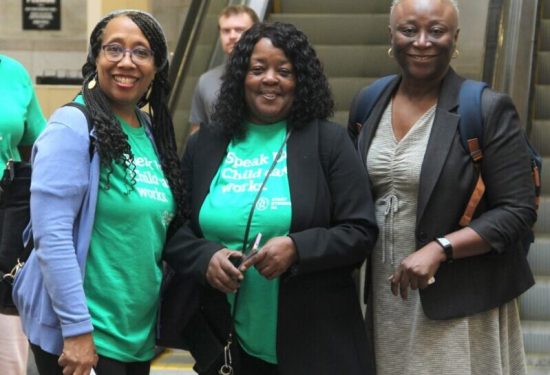The Child and Adult Care Food Program (CACFP) is a federal nutrition program that provides reimbursement for nutritious meals and snacks served to millions of eligible children who are enrolled at participating child care centers, family child care homes, afterschool programs, and emergency shelters.
The early childhood workforce in Early Head Start, Head Start, child care centers and family child care is working tirelessly to ensure children do not go hungry and continue to have opportunities to learn and grow, all while one out of three child care providers is worried about having enough to eat at the end of the month. CACFP reimbursements help providers absorb some of the costs of providing a meal and snacks to children in their care. Participating home-based child care providers partner with a CACFP Sponsor for payment, training and monitoring. Sponsors offer support for meal planning, nutrition education, and peer-to-peer connection, as well as paperwork processing and ensuring compliance.
Unfortunately, the most recent data from the United States Department of Agriculture shows the number of home-based child care providers participating in CACFP, and the number of CACFP Sponsors available to make their participation possible, is declining rapidly.
Ensuring CACFP payment and accountability policies and practices are just and equitable is fundamental to robust and accessible food and child care systems. There are federal legislative and regulatory opportunities to invest in, improve, and strengthen CACFP.
In March 2024, the USDA published a proposed rule and opened a 90-day public comment period on one – very large – aspect of CACFP: the serious deficiency process.
The CACFP serious deficiency process is in federal regulation and is a tool for states and sponsoring organizations of “family day care homes” (the term in the federal law and federal regulation) to use when participating programs are not following CACFP rules. The process is a precursor to corrective action and/or termination from CACFP.
While program integrity, child safety and stewardship of public funds are important shared priorities, the current process simply does not work. Unfortunately, as serious deficiency is currently implemented, providers experience a subjective process with swift and harsh penalties. We believe the combination of unclear rules and processes and harsh penalties may be creating too much risk for Sponsors and providers to participate in the program.
For example, there is not a clear way within current serious deficiency policy to calibrate for severity of the issue. So a mistake on paperwork and outright fraud could be weighed the same; a mistake on complying with the meal pattern and a concern with child safety could be weighed the same. This level of stress hangs in the air for too many home-based child care providers. Providers have shared being brought into the serious deficiency process for underpaying themselves on one month’s claim form; and for a WIC poster (mandatory to display) falling off the wall. The penalties for noncompliance can result in disallowance of reimbursement and could also lead to a serious deficiency finding. Providers believe that, especially for those unintentional errors, this is unreasonably harsh.
Another challenge is the high cost of noncompliance: If a serious deficiency finding leads to termination from the CACFP program, the parties found responsible are put on the National Disqualified List (NDL) for seven years resulting in exclusion from CACFP and possible impacts to eligibility for other federally funded programs or future employment. The entire child care community should be concerned about this as an equity issue.
Providers want a common-sense process that appreciates the human nature of child care. That understanding is not reflected in the serious deficiency process currently. We understand from the provider community that the starting place is not a policy and practice of assistance and support.
“Children aren’t born with a manual. If they are hungry 15 minutes before lunch is scheduled, I’m going to feed them lunch. If my monitor shows up at the scheduled lunch time and does not see a meal, that’s a problem. There needs to be a human aspect to the record-keeping of the program.”
-Home-based child care provider, California
“This program is about more than food, it is about meals, and time together,” says Elyse Vitale, Executive Director of the CACFP Roundtable. At Home Grown, we know this needs to be relationship-based and strengths-based work and are using the comment period to share provider voices and insights with the federal government.
“The approach the monitors take makes all of the difference. You have to be able to build that trusting relationship. If my monitor comes into my kitchen and looks in my fridge or cupboards to see what is being served, I don’t feel like she’s doing it to catch me doing something wrong. It’s to help me and educate me.” – Home-based child care provider, California
The relational approaches are in no way a substitute for solving the CACFP pay rates that do not keep up with inflation, or the amount of work time compliance takes without compensation for the home-based child care provider. All of this is connected to the policy and experience of serious deficiency, too.
Improving the serious deficiency process is a crucial step to ensuring children can have healthy meals and snacks while in child care, from providers and CACFP Sponsors who they trust and rely on.
We are thrilled that USDA is listening and has opened a public comment period on the proposed rule for serious deficiency. We look forward to working with USDA on our shared goals of feeding young children nutritious meals and bolstering the child care sector.
The Home Grown team is working with our community of providers and partner organizations to understand the serious deficiency proposed rule and prepare comments. Together we can communicate solutions for clarity of expectations, objective review, support interventions as well as consequences that are justly and equitably applied. Comments are due May 21, 2024. “Model comments” are being prepared by Home Grown and partners to amplify a unified message. If you or your organization is interested in engaging in this – to inform our comments or to get a sample to make your own – please contact Mary Beth, a consultant with the Home Grown team.




